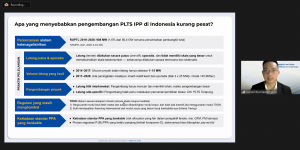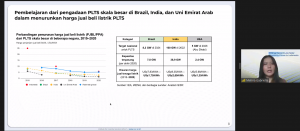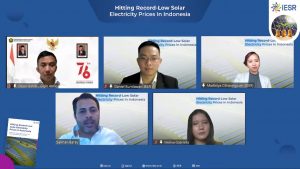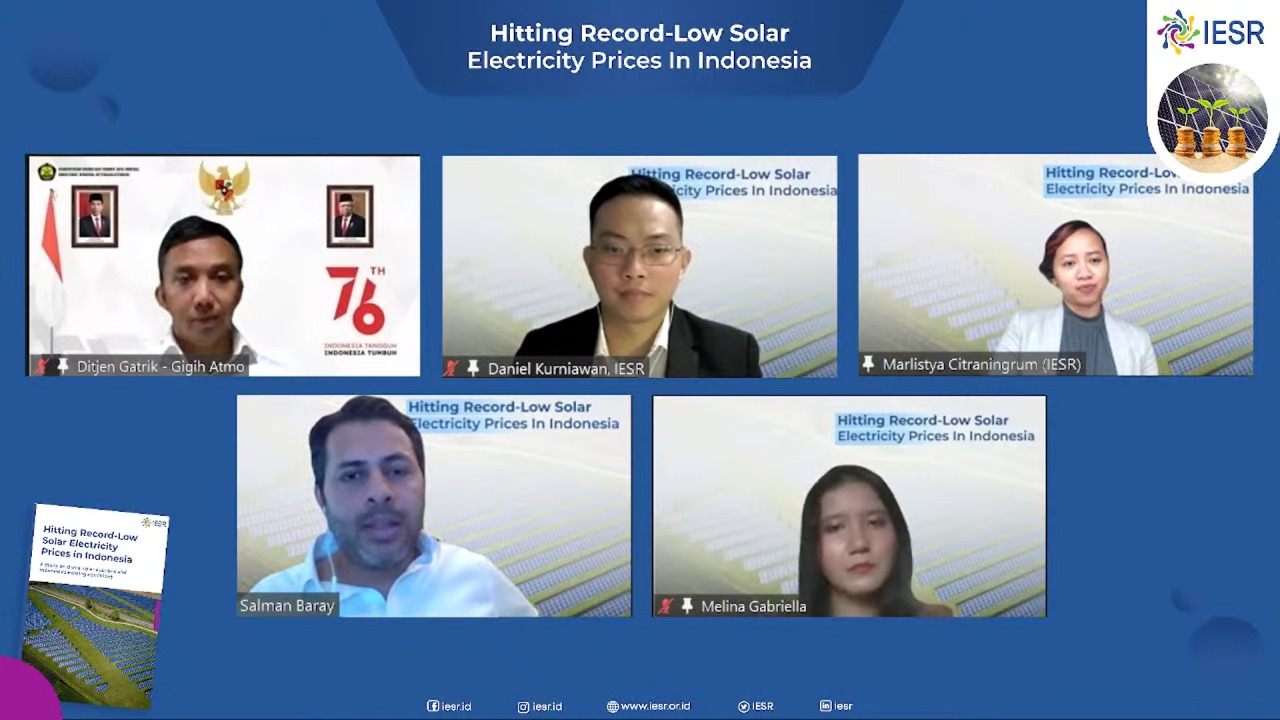Given the potential for solar energy that reaches 20.000 GW, the utilization of solar energy on a utility scale is still very small in Indonesia. It is recorded that until 2020, the total installed capacity of solar energy is 186 MW. Especially for utility-scale solar power plants, the number of auctions that have taken place so far are still sporadic and unstructured. In order to accelerate solar energy more massively, a more structured and comprehensive plan is needed to ensure project availability. This policy reform certainly requires commitment and strong political leadership from the current government.
As one of the co-signatories of the Paris Agreement, Indonesia has a target to achieve the renewable energy mix target of 23% by 2025. Unfortunately, until now the achievement of the energy mix has only reached around 12%. In the short term, Indonesia must increase its renewable energy capacity. Dadan Kusdiana, Director General of New and Renewable Energy, and Energy Conservation, Ministry of Energy and Mineral Resources said in a webinar launching the report “Hitting Record-Low Solar Electricity Prices in Indonesia” that it takes at least 4 times the effort to achieve the energy mix target of 23%.
“Currently we are trying to reach the target of 23%. From the electricity sector, we are preparing a new RUPTL that accommodates a larger portion of EBT, the figure is up to 51%,” explained Dadan.
Cita Dewi, Executive Vice President of PT PLN’s New and Renewable Energy Division, continued that the presence and contribution of PV solar is one of the main options for increasing renewable energy in the future in addition to hydro.
“We are very happy to see the current development of PV technology, especially for the declined intermittency side. As a result, they are increasingly competitive and the rates tend to fall. Both the state and PLN can gain benefits from PV,” she said.
The direction of the government’s steady commitment to accelerating renewable energy is a good sign. However, considering the current condition of Indonesia, who must meet the target of installed capacity of renewable energy in a short time, a strategic move is needed to create a mature solar ecosystem.
Daniel Kurniawan, a photovoltaic specialist researcher as well as the author of this report, explained that the reason why utility scale PV has not developed rapidly in Indonesia is partly because of the less ambitious planning of the electricity system to include solar PV in it.

“So far, we have seen that solar auctions are still sporadic, or buy-out, and do not have a large scale to maximize its economic benefits. In this case, the determination of the target for the auction in the next 5 years, for example, is important. The government can help by making a feasibility study or land acquisition,” he said.
The Local Content Requirement (TKDN) is still an obstacle to the acceleration of the solar industry in Indonesia because the price of domestic panels are more expensive, but the efficiency is lower. Entrepreneurs also find it difficult to get international capital assistance because the quality of these domestically made panels has not been tested for quality. To deal with this issue, the government needs to consider separating TKDN and non-TKDN auctions according to the readiness of local industries.
Melina Gabriella, IESR Energy Transformation Program Officer, who also co-authored this report, added that to achieve affordable solar prices, Indonesia can learn from countries with low solar auction prices, such as Brazil, India, and the United Arab Emirates.

“Some of the lessons that we can take from those countries include the commitment and strong leadership from the government which is revealed in policy products such as qualification standards and PPA, as well as the transparency of auction and clarity of rules. The establishment of a special agency to manage the tender process should also be considered. In addition, the Indonesian government also needs to review supporting regulations such as TKDN and tariff setting policies,” explained Melina.
The integration of solar in the national electricity supply program is the key to the development of solar energy. Therefore, a structured, measurable and comprehensive auction planning needs to be carried out by the government. National targets for solar energy need to be set and a strategic roadmap for achieving them made.
Gigih Udi Atmo, Coordinator of Electricity Business Preparation, Director General of Electricity, MEMR, appreciated this latest report from IESR, and stated that the government is currently focusing on pursuing the 23% renewable energy mix target by 2025.
“We need to see why we need to accelerate solar energy. There are at least two big targets, namely 2025, a 23% NRE mix and net-zero emissions in the long run. So the context is how solar can contribute to achieving the existing targets,” Gigih said.
Salman Baray, Country Director of Indonesia ACWA Power, shared his experience of participating in solar auctions in various places, both Indonesia and abroad.

“Many investors have looked at Indonesia as a place to invest, but in terms of regulations and government support, certain improvements need to be made. For example, assisting in the land auction process, tax incentives, regulations related to local content requirement, as well as making it easy to get local funding,” Salman closed his explanation.

